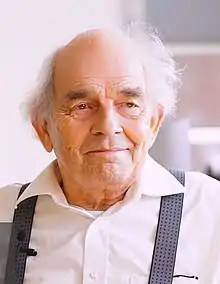Gerard Endenburg
Gerard Endenburg (born 1933) is a Dutch entrepreneur, who developed the Sociocratic Circle Organisation Method (SCM), which is a decision-making method for governing and managing organizations and societies based on equivalence and draws inspiration from cybernetics. Endenburg was inspired by the idea of sociocracy of Kees Boeke.
Gerard Endenburg | |
|---|---|
 Gerard Endenburg, photo by Charlie Shread | |
| Born | June 1933 |
| Nationality | Dutch |
| Alma mater | University of Twente |
| Known for | Sociocracy |
Biography
Endenburg was born in Rotterdam in 1933.[1] He was a Quaker, and attended a Quaker boarding school, the "Werkplaats Kindergemeenschap" (Children's Community Workshop), where he was influenced by Kees Boeke and his wife Betty Cadbury and the ideas of sociocracy.[1] The school involved students in consensus decision-making.
He became general manager of his family's engineering company, Endenburg Elektrotechniek BV, in the mid-1960s, and in the 1970s started pioneering and applying the sociocratic method of organizing within the company.[1] In 1978, Endenburg founded the Sociocratic Center Netherlands to develop and implement the sociocratic approach in other organizations, serving as its director.[1] In 1992, Endenburg obtained a doctoral degree from the University of Twente, based on his dissertation "Sociocratie als Sociaal Ontwerp" (later translated and published in English as 'Sociocracy as Social Design').[2] Endenburg was an honorary professor in Organizational Learning at Maastricht University.[3]
See also
References
- Quarter, J. (2000) Beyond the Bottom Line: Socially Innovative Business Owners, Greenwood Press, p. 53-66.
- Endenburg, G. (1998). Sociocracy as Social Design. Delft, Netherlands: Eburon.
- Cooper, Rachel; Junginger, Sabine; Lockwood, Thomas (2011). The Handbook of Design Management. Bloomsbury. ISBN 9781472570178.
